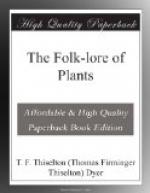“’Tis thought the king is
dead; we will not stay,
The bay-trees in our county are all withered.”
Lupton, in his “Notable Things,” tells us that,
“If a fir-tree be touched, withered, or
burned with lightning, it
signifies that the master or mistress thereof
shall shortly die.”
It is difficult, as we have already noted in a previous chapter, to discover why some of our sweetest and fairest spring-flowers should be associated with ill-luck. In the western counties, for instance, one should never take less than a handful of primroses or violets into a farmer’s house, as neglect of this rule is said to affect the success of the ducklings and chickens. A correspondent of Notes and Queries (I. Ser. vii. 201) writes:—“My gravity was sorely tried by being called on to settle a quarrel between two old women, arising from one of them having given one primrose to her neighbour’s child, for the purpose of making her hens hatch but one egg out of each set of eggs, and it was seriously maintained that the charm had been successful.” In the same way it is held unlucky to introduce the first snowdrop of the year into a house, for, as a Sussex woman once remarked, “It looks for all the world like a corpse in its shroud.” We may repeat, too, again the familiar adage:—
“If you sweep the house with blossomed
broom in May,
You are sure to sweep the head of the
house away.”
And there is the common superstition that where roses and violets bloom in autumn, it is indicative of some epidemic in the following year; whereas, if a white rose put forth unexpectedly, it is believed in Germany to be a sign of death in the nearest house; and in some parts of Essex there is a current belief that sickness or death will inevitably ensue if blossoms of the whitethorn be brought into a house; the idea in Norfolk being that no one will be married from the house during the year. Another ominous sign is that of plants shedding their leaves, or of their blossoms falling to pieces. Thus the peasantry in some places affirm that the dropping of the leaves of a peach-tree betokens a murrain; and in Italy it is held unlucky for a rose to do so. A well-known illustration of this superstition occurred many years ago in the case of the unfortunate Miss Bay, who was murdered at the piazza entrance of Covent Garden by Hackman (April 1779), the following account of which we quote from the “Life and Correspondence of M. G. Lewis":— “When the carriage was announced, and she was adjusting her dress, Mr. Lewis happened to make some remark on a beautiful rose which Miss Kay wore in her bosom. Just as the words were uttered the flower fell to the ground. She immediately stooped to regain it, but as she picked it up, the red leaves scattered themselves on the carpet, and the stalk alone remained in her hand. The poor girl, who had been depressed in spirits before, was evidently affected by this incident, and said, in a slightly faltering voice, ‘I trust I am not to consider this as an evil omen!’ But soon rallying, she expressed to Mr. Lewis, in a cheerful tone, her hope that they would meet again after the theatre—a hope, alas! which it was decreed should not be realised.” According to a German belief, one who throws a rose into a grave will waste away.




